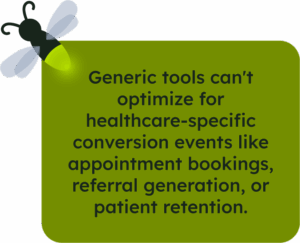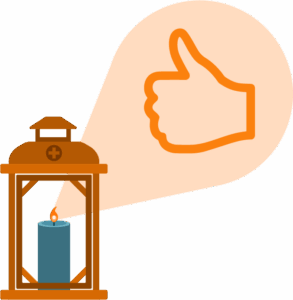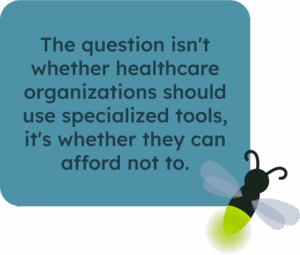A cardiology practice and a local restaurant both need customers. Both want online reviews, social media presence, and effective digital marketing. So why shouldn’t they use the same tools?
This assumption is costing healthcare organizations patients every day. While generic marketing platforms promise one-size-fits-all solutions, healthcare operates under fundamentally different rules than every other industry. The organizations that understand this difference are quietly capturing market share from competitors still trying to make generic tools work for healthcare-specific challenges.
The Problem with Generic Solutions
Generic marketing tools were built for businesses that can freely share customer data, track behavior across platforms, and use standard analytics without compliance concerns. Healthcare organizations can’t do any of these things without risking massive fines and violating patient trust.
Even if users accept tracking cookies, that does not meet the standard for a HIPAA-compliant patient authorization. Google Analytics and similar tools still capture PHI (even if they don’t store it) and HIPAA violations occur at the moment of collection, not just at storage. This means healthcare organizations using standard marketing analytics are potentially violating HIPAA every time they track patient behavior on their websites.
The compliance issues extend beyond just data collection. Generic platforms don’t understand that healthcare communications require different consent mechanisms, that patient feedback often needs action-oriented responses, or that marketing automation must account for medical privacy laws.
Why Healthcare Marketing Is Different
Healthcare marketing isn’t just B2C marketing with medical terminology. The decision-making process, emotional stakes, and regulatory environment create unique challenges that generic tools simply can’t address.
Patient acquisition in healthcare involves highly personal, often stressful decisions. Someone choosing a cardiologist isn’t comparison shopping like they would for a restaurant. They’re making decisions based on trust, reputation, accessibility, and clinical competence. These factors require specialized measurement and optimization approaches.
Generic ads won’t cut it in healthcare. Healthcare organizations need to create very targeted campaigns designed specifically to reach patients, caregivers, or referring physicians. The targeting, messaging, and conversion tracking all require healthcare-specific expertise that generic platforms lack.
The patient journey itself is more complex. Unlike retail customers, patients often research providers for weeks or months before making appointments, involve family members in decisions, and consider factors like insurance acceptance and location convenience that don’t apply to other industries.
The Hidden Costs of Using Generic Tools 
Healthcare organizations using generic marketing tools face three major hidden costs: compliance risk, missed opportunities, and measurement gaps.
Compliance Risk: Healthcare organizations must obtain explicit patient consent before using PHI in any marketing campaign. This ensures transparency and gives patients control over their information. Generic tools don’t provide the data handling safeguards required for healthcare marketing, creating ongoing compliance exposure.
Missed Opportunities: Generic tools can’t optimize for healthcare-specific conversion events like appointment bookings, referral generation, or patient retention. They’re built for e-commerce transactions and lead generation, not the complex patient acquisition patterns that drive healthcare revenue.
Measurement Gaps: Patient acquisition cost embraces all marketing expenses to acquire a single patient. PAC indicates the effectiveness of healthcare marketing efforts, but generic tools can’t accurately track the patient journey from initial search through appointment completion and follow-up care.
 What Healthcare-Specific Solutions Get Right
What Healthcare-Specific Solutions Get Right
Platforms designed specifically for healthcare understand the industry’s unique requirements from the ground up. They’re built with HIPAA compliance, patient privacy, and healthcare-specific metrics as core features, not afterthoughts.
Built-in Compliance: Healthcare-specific platforms provide the necessary safeguards for patient data handling, consent management, and communication tracking.
Healthcare-Optimized Analytics: Instead of generic website traffic and conversion tracking, healthcare-specific tools measure appointment bookings, patient lifetime value (PLV), referral patterns, and reputation metrics that actually drive healthcare business outcomes.
Patient Journey Understanding: Specialized platforms recognize that healthcare decisions involve longer consideration periods, multiple stakeholders, and emotional factors that don’t apply to typical consumer purchases. Their automation and tracking systems are designed around these considerations.
The Reputation Management Advantage
One area where the difference between generic and healthcare-specific tools becomes particularly clear is reputation management. Generic review management platforms treat all reviews the same, but healthcare reviews require different handling strategies.
Patient reviews often contain sensitive information, emotional responses to medical outcomes, and feedback about clinical care that requires specialized response approaches. Generic platforms can’t provide the templates, compliance guidance, and healthcare-specific response strategies that optimize patient acquisition while maintaining professional standards.
Healthcare-specific platforms also understand that medical reviews influence internal referral patterns, not just external patient acquisition. Primary care physicians increasingly check online reputations before making specialist referrals, creating a feedback loop that generic tools can’t track or optimize.
The Integration Reality 
Healthcare organizations need their marketing tools to integrate with practice management systems, electronic health records, and other healthcare-specific software. Generic marketing platforms weren’t built for these integrations, creating data silos and manual processes that reduce marketing effectiveness.
Healthcare-specific platforms are designed to work within the existing healthcare technology ecosystem, enabling automated patient communication workflows, appointment-based marketing triggers, and comprehensive patient journey tracking across all touchpoints.
Making the Switch
The question isn’t whether healthcare organizations should use specialized tools, it’s whether they can afford not to. Generic solutions might appear cost-effective initially, but the hidden costs of compliance risk, missed opportunities, and measurement gaps quickly add up.
 Organizations that have made the switch to healthcare-specific platforms report better patient acquisition metrics, reduced compliance concerns, and more actionable insights into what actually drives their patient growth.
Organizations that have made the switch to healthcare-specific platforms report better patient acquisition metrics, reduced compliance concerns, and more actionable insights into what actually drives their patient growth.
The choice isn’t between expensive and cheap marketing tools. It’s between tools built for your industry’s specific challenges and tools that ignore those challenges entirely. In healthcare, that difference determines not just marketing effectiveness, but compliance, patient trust, and long-term organizational success.











